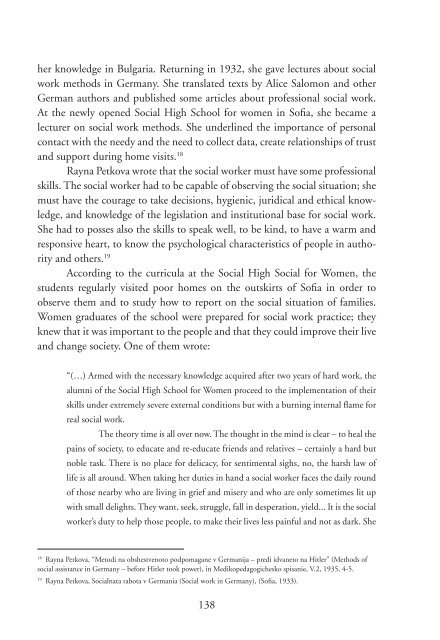Teaching Gender in Social Work - MailChimp
Teaching Gender in Social Work - MailChimp
Teaching Gender in Social Work - MailChimp
You also want an ePaper? Increase the reach of your titles
YUMPU automatically turns print PDFs into web optimized ePapers that Google loves.
her knowledge <strong>in</strong> Bulgaria. Return<strong>in</strong>g <strong>in</strong> 1932, she gave lectures about social<br />
work methods <strong>in</strong> Germany. She translated texts by Alice Salomon and other<br />
German authors and published some articles about professional social work.<br />
At the newly opened <strong>Social</strong> High School for women <strong>in</strong> Sofia, she became a<br />
lecturer on social work methods. She underl<strong>in</strong>ed the importance of personal<br />
contact with the needy and the need to collect data, create relationships of trust<br />
and support dur<strong>in</strong>g home visits. 18<br />
Rayna Petkova wrote that the social worker must have some professional<br />
skills. The social worker had to be capable of observ<strong>in</strong>g the social situation; she<br />
must have the courage to take decisions, hygienic, juridical and ethical knowledge,<br />
and knowledge of the legislation and <strong>in</strong>stitutional base for social work.<br />
She had to posses also the skills to speak well, to be k<strong>in</strong>d, to have a warm and<br />
responsive heart, to know the psychological characteristics of people <strong>in</strong> authority<br />
and others. 19<br />
Accord<strong>in</strong>g to the curricula at the <strong>Social</strong> High <strong>Social</strong> for Women, the<br />
students regularly visited poor homes on the outskirts of Sofia <strong>in</strong> order to<br />
observe them and to study how to report on the social situation of families.<br />
Women graduates of the school were prepared for social work practice; they<br />
knew that it was important to the people and that they could improve their live<br />
and change society. One of them wrote:<br />
“(…) Armed with the necessary knowledge acquired after two years of hard work, the<br />
alumni of the <strong>Social</strong> High School for Women proceed to the implementation of their<br />
skills under extremely severe external conditions but with a burn<strong>in</strong>g <strong>in</strong>ternal flame for<br />
real social work.<br />
The theory time is all over now. The thought <strong>in</strong> the m<strong>in</strong>d is clear – to heal the<br />
pa<strong>in</strong>s of society, to educate and re-educate friends and relatives – certa<strong>in</strong>ly a hard but<br />
noble task. There is no place for delicacy, for sentimental sighs, no, the harsh law of<br />
life is all around. When tak<strong>in</strong>g her duties <strong>in</strong> hand a social worker faces the daily round<br />
of those nearby who are liv<strong>in</strong>g <strong>in</strong> grief and misery and who are only sometimes lit up<br />
with small delights. They want, seek, struggle, fall <strong>in</strong> desperation, yield... It is the social<br />
worker’s duty to help those people, to make their lives less pa<strong>in</strong>ful and not as dark. She<br />
18<br />
Rayna Petkova, “Metodi na obshestvenoto podpomagane v Germanija – predi idvaneto na Hitler” (Methods of<br />
social assistance <strong>in</strong> Germany – before Hitler took power), <strong>in</strong> Medikopedagogichesko spisanie, V.2, 1935, 4-5.<br />
19<br />
Rayna Petkova, <strong>Social</strong>nata rabota v Germania (<strong>Social</strong> work <strong>in</strong> Germany), (Sofia, 1933).<br />
138

















